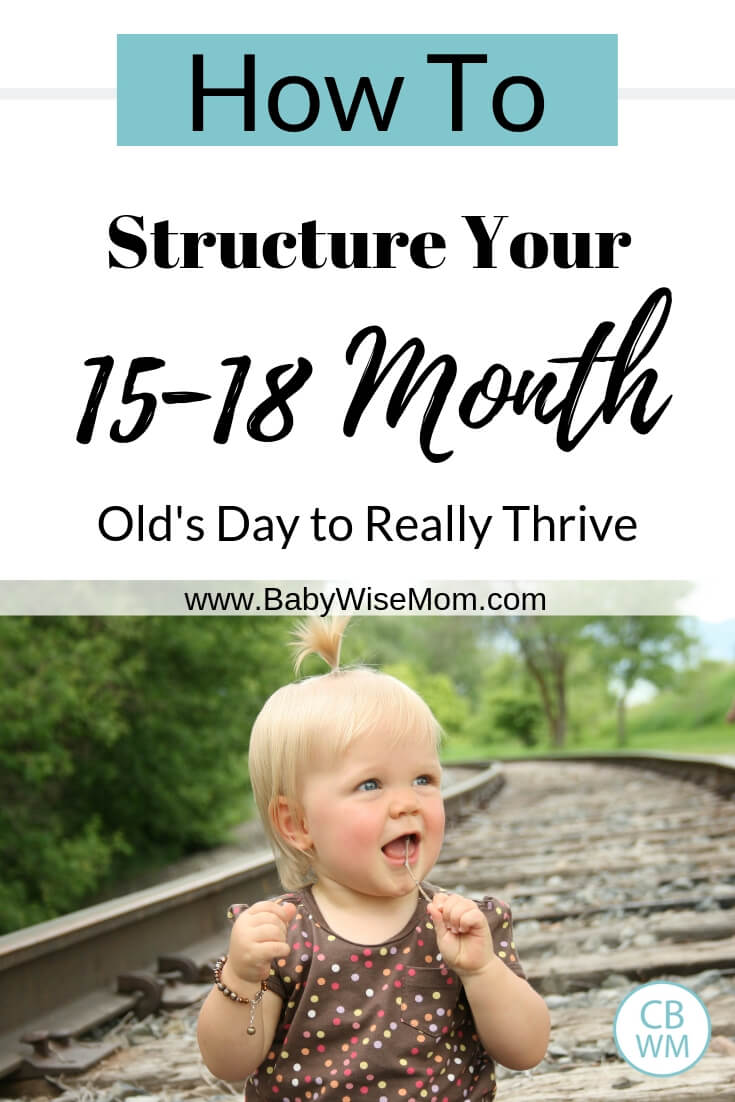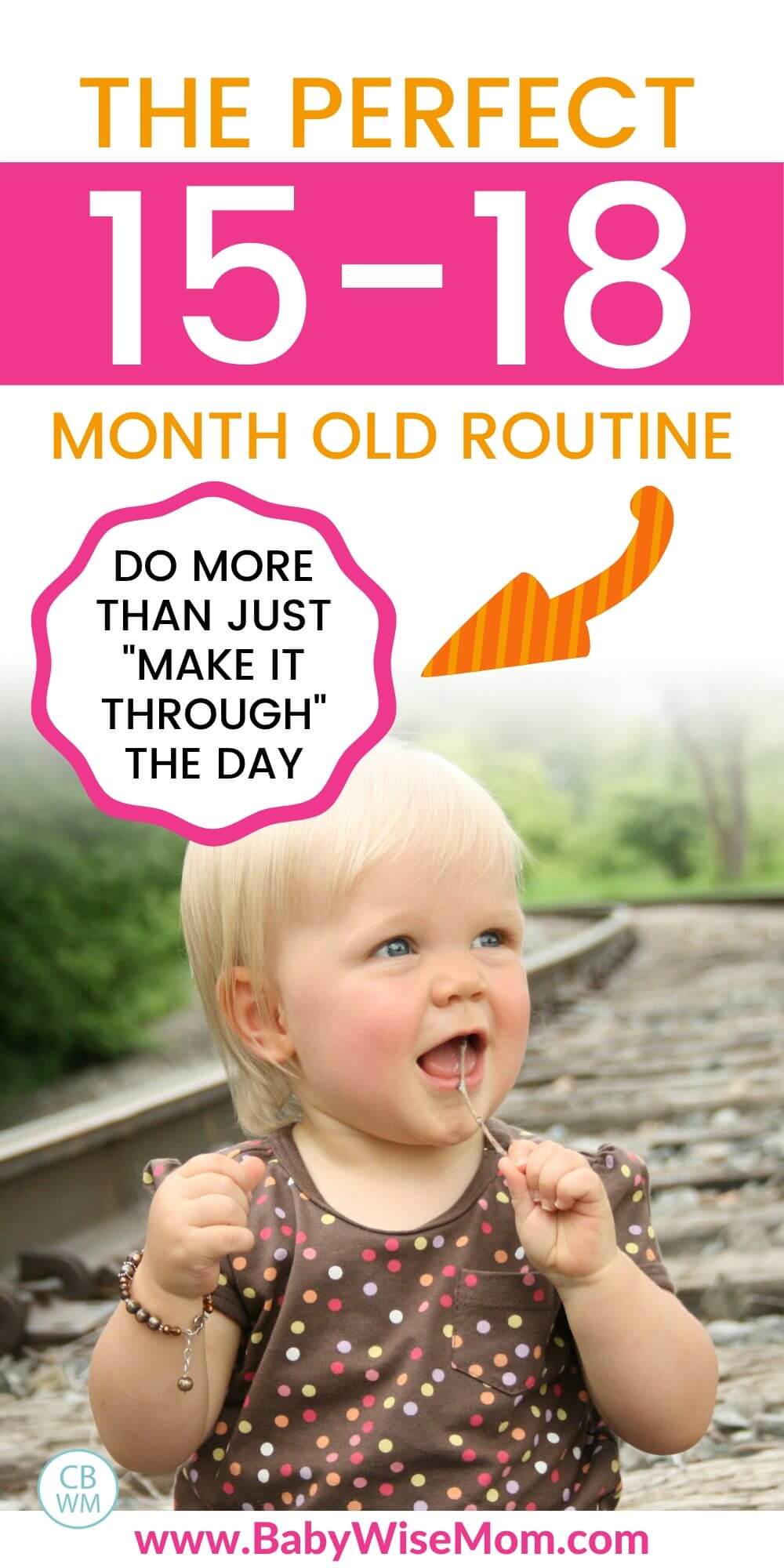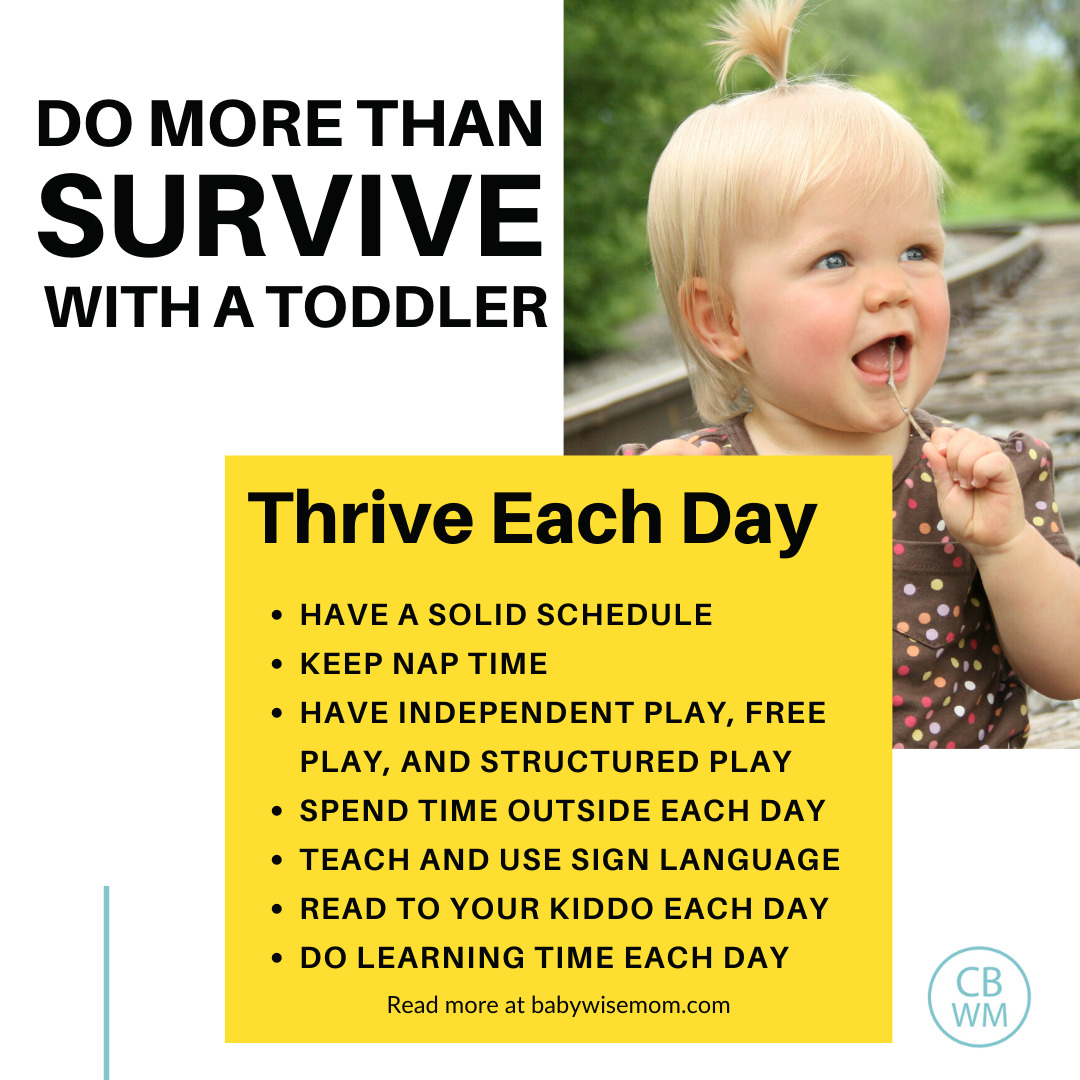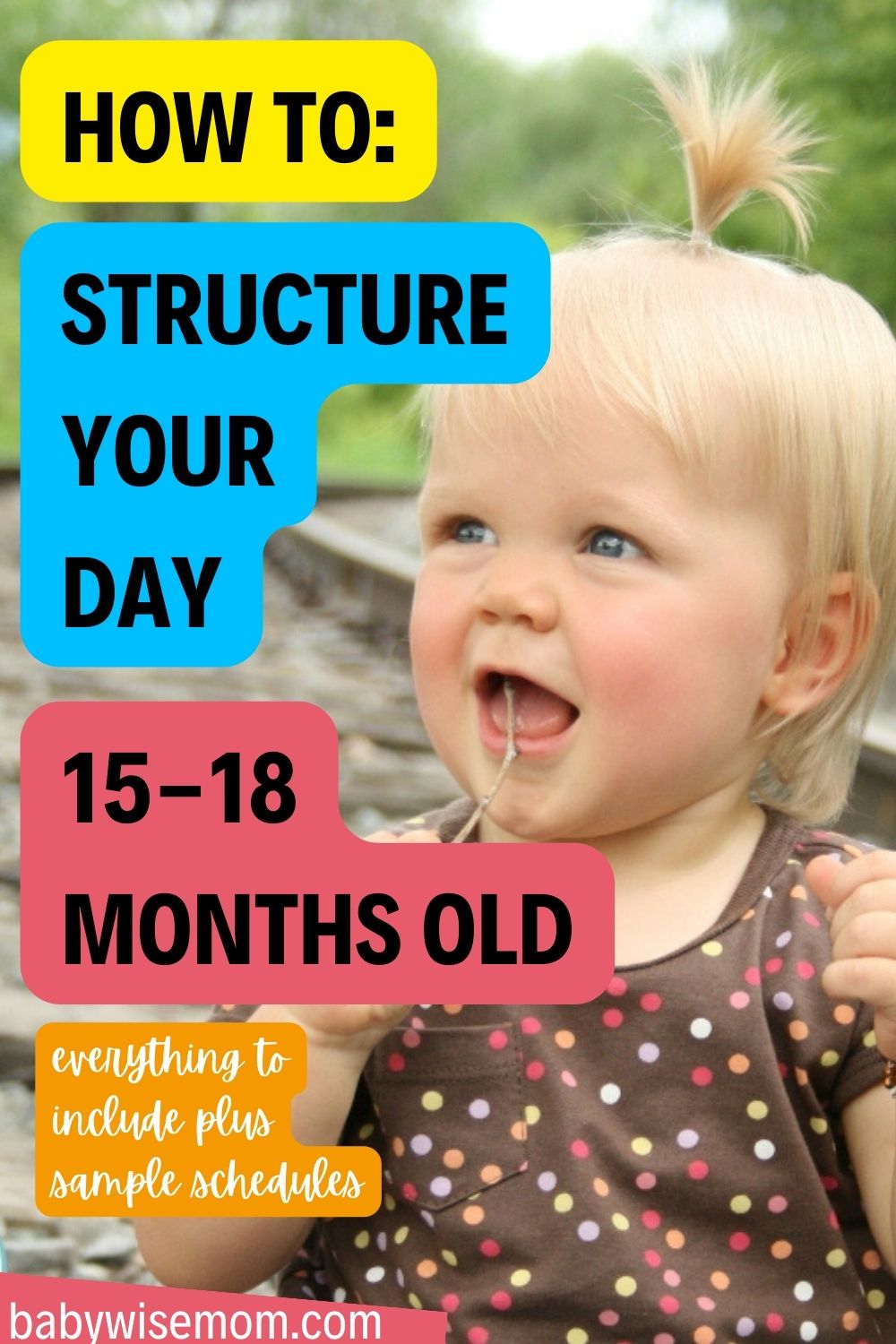How to do more than just make it through each day with your toddler. Tips to structure your toddler’s day and really thrive! Thrive rather than just survive!
Whew! You have a pretoddler and have survived your first year with your baby.
This is not a time to pat yourself on the back and stop working toward goals. You still have about 17 good years of training your child to put in, so keep working at it!
Your toddler might be eating and sleeping well, but that is only a small portion of what you want for your child. The eating and sleeping well are good stepping stones for working on the bigger picture; they are not THE picture.
These three months of 15-18 months old can be really easy or a bit of a challenge. They might be really easy if your toddler sticks to two naps a day. If your toddler moves to one, however, you might find yourself wondering what to do with your child during all of this extra time.
>>>Read: How To Fill Toddler’s Time When Transitioning to One Nap
By 15 months old, most toddlers are walking and can say at least one word. I personally love toddlers. They are so fun. Everything around them is so fascinating, and as you spend time with them, you come to see and hear things you hadn’t paid attention to in years.
Much of the advice for 15-18 months is the same as 12-15 months. In this post, I will list the different activities for the day and special considerations for each activity, I am going to delve into the whys behind the activities to help you keep a focus in mind while you do it. Having a goal to work toward is a big difference between making it through the day and more than making it through the day.
I will finish up with some sample schedules for this age.
Be sure to also see this post for schedule ideas: Sample Schedules: One Year and Up
Meal Time for Your Toddler
Here are some concerns you are probably facing with your pretoddler.
Self-Feeding: The biggest concern with mealtimes during this time will be your toddler learning to eat from a spoon. Expect things to be messy as he learns. He can’t be perfect. See this post for more: When Does a Toddler Master Spoon Skills
Throwing/Dropping Food: Your toddler might start to throw or drop food from the highchair as he now has more control over his food. See this post: Throwing/Dropping Food off of the Tray for help with this.
Food Amounts: Just because he is now a toddler does not mean you will worry less about his food intake. Pretoddlers eat less than they used to and this is normal! See Correct Food Portions for Kids from Baby-8 Years for guidance.

Nap Time For Your Toddler
There is a good chance your toddler will be ready to drop the morning nap during this period. Most drop it around 18 months, though there is a wide range around that.
These posts will all help you with the nap time concerns you are facing with your pretoddler.
Play Time Activities For Your Toddler
Here are some different playtime activities you will want to include in your pretoddler’s day each day.
Independent Playtime
Toddlers can play independently! If you started this as a baby, keep it up. If you haven’t done it yet, it isn’ too late to start!
By the end of this age range, most kids will be ready to move to roomtime for independent play rather than playpen time if they haven’t already. And it still isn’t too late to start this if you haven’t already.
Free Playtime
Not all playtime needs to be structured. You want some free play each day, also.
You allow your child to choose the activity he plays with. That is why it is “free.” He doesn’t get to jump from activity to activity; you want him to learn to have a sustained attention span. But he can have more than one toy available to him during this time. Free playtime can really be any activity the child chooses. Your toddler still needs to be supervised during this playtime.
>>>Read: How To Use Free Playtime In Your Child’s Schedule
Structured Playtime
Structured playtime is when Mom decides the activity. This is a good thing for your toddler to learn to accept; in educational settings (and life), we don’t always get to choose what we do. This time can be art, music, puzzles, or other learning activities. The child can work alone or with a parent or sibling (see below).
>>>Read: A Parent’s Complete Guide to Structured Playtime
Sibling Playtime
If your toddler has siblings, you can have sibling playtime. This can overlap with other activities if needed. For example, the siblings can both color at the table together for structured playtime. Or maybe they will go outside to play together for outside time.
Keep in mind that most 15-18 month olds are not interactive players. They play in tandem. They won’t necessarily play with the older sibling. However, some will. Kaitlyn is very social and would actually play with Brayden during this time. From what I read, it is common for younger siblings to be more socially interactive at an earlier age than the oldest who was an only child.
>>>Read: Structured Playtime with Siblings
One-On-One Dates With Parents
The importance of this activity never diminishes. Continue to be sure to incorporate one-on-one time with each parent each day. This can overlap with structured playtime. Mommy or Daddy can sit at the table with the toddler while he colors and join in the coloring. It can also overlap with other appropriate playtime activities.
See my Dates With Kids Post for lots of ideas on what to do together.

Friend Time
The older your toddler gets, the more he will enjoy playing with friends. At this age, play is still very much in tandem; they don’t really interactively play with each other. But being in each other’s presence is fun.
Be sure you take things at the pace of your individual child. Some toddlers will love jumping in with a bunch of other rowdy toddlers. Others will need some time to get used to the activity and might prefer starting with just one other toddler.
>>>Read: How to Organize a Playgroup
Family Time
It is fun to do activities together as a family. You might go for walks, read books, work in the yard, go out to dinner, take a vacation, go to a museum…the possibilities are endless.
Bathtime
Bath time can be a fun time to get water play in. It is a good opportunity for your child to fulfill that curiosity with water. What happens when I dump a cup of water out? Your child can figure that out in the tub. It will also stimulate the sense of touch and makes for great sensory playtime. Best Toys for Baby: Bath Toys
Time Outside
You can continue the activities you have been doing outside (walks, hikes, etc.). Here are some other ideas:
- Sledding: You can still spend time outside if there is snow. Be sure to dress your child appropriately. I have heard it is a good idea to not allow a child to be out in the cold for longer than 15 minutes at a time, though I have nothing to back that up with.
- Sandbox: The sandbox is a fun place to play.
- Mimic: Toddlers love to mimic their parents. If you garden, you might get some gardening toys for your toddler. If you have a lawn to mow, a lawnmower.
- Bubbles: This is always fascinating for the toddler.
- Outside Toys: See this post for outside toy ideas: Outdoor Toys Children Will Love
Arts
You can add some time for the arts. You might dance, sing, and/or draw. It is wonderful to pass on your passion to your children, but also be sure you expose them to arts that aren’t necessarily your interest.
For example, I love to sing and I love to dance. It is quite natural for me to expose my children to these items. I am not an artist when it comes to drawing, painting, etc. These are activities I have to make a conscious effort to add to our day because it isn’t a natural interest of mine.
Toys
Your child’s interests and abilities will continue to mature as he gets older. See this post: Best Toys for Pretoddler: 12-18 Months
Language Development for Your Toddler
As your toddler starts to speak more, it will be easier for this to be a focus for you. Your toddler will demonstrate more and more the vast amount that he understands. You will most likely be quite shocked at how much your child really understands. Continue to work on language development with these activities:
- Sign Language: It isn’t too late to start this. Watch for words that would help your child avoid tantrums or words that your child seems to try to communicate but can’t say yet. It can also come in handy for those words that sound the same. Many toddlers pronounce words very similarly. If you have signs to turn to, you can help have more effective communication. If you have been doing this for a while, you can most likely do a new word each day, or at least several per week. Sign Language
- Reading: Reading is a fun activity to have as one-on-one time with a parent. Be sure to point to the objects in the book and name them for your toddler. The Value of Reading Aloud to Your Children
- Talk Back: When your child talks to you, listen and talk back. Keep in mind the principles from the previous making it through the day post for ages 9-12 months old.
>>>Read How To Enhance Your Child’s Language Development
Learning Time for Your Toddler
You might be especially interested in learning activities now. Keep in mind that your child can’t learn things he isn’t taught, so this is up to you. See these posts:

Goal Setting
We want to really focus on why we are doing what we are doing as parents (see Why vs. How ). To do more than make it through the day, it requires structure, organizing, and planning. All of the categories listed above serve more purpose than simply giving you and your toddler something to do all day. You are preparing your child for life.
On Becoming Toddlerwise discusses three major categories you want to focus on (page 45):
Moral Training: You teach self-control, obedience, manners, patience, sitting, focusing, concentrating, and relationship with peers, siblings, and adults. Independent playtime, free playtime, structured playtime, sibling playtime, friend playtime, and one-on-one time with parents all contribute to meeting these goals. See also:
Academic Skills: This is teaching ABCs, mathematics, language, reading, and more. Structured playtime and one-on-one time with parents are both excellent points in the day to teach academic skills.
You can also learn to work these things in throughout the day. When you are on a walk, you can count how many cars, cats, birds, etc. you see.
You can get foam letters for the bathtub and sing the ABCs during bathtime. These skills can always be incorporated into your activities. Remember that people learn line upon line. Teach your child in steps (see the learning section above for more about learning).
Spiritual Training: This involves anything spiritual that is appropriate to teach your child. This can be teaching to say prayers, which at first is done by the parent showing the example of how to do things. You can read scripture stories and teach about important people in your faith.
You want to set age-appropriate goals for these areas. Don’t do too many at once; you will only stress yourself and your toddler out. Think of where you want your toddler to be in a few months and work toward that. Your toddler needs direction to get there.
For more on goal-setting, see Beliefs and Goals and How They Impact Parenting
Also, On Becoming Toddlerwise is written for ages 1-2 years old. Be sure to read it. On Becoming Toddlerwise

Discipline for Your Toddler
If you have a toddler, you will need to have discipline in your life.
I have a lot of posts to help you with disciplining your toddler. Here are some of my favorites.
Sample Schedules for 15-18 Months Old
Here are some schedules my children actually used in these age ranges. These can help you see how to structure your day with your pretoddler.
You will notice as you look through that schedules really don’t shift too much in this age range unless the child is moving from 2-1 naps. This is a great relief after schedules changed all the time with babies!
15 Month Old Sample Schedules
Two naps:
8:45–sippy of milk, fruit, cereal, yogurt, finger foods.
Get ready for the day
Independent Playtime happens in this block
11:15–nap starts
12:45–wake up, sippy with solids (veggie, fruit, other foods we are eating)
3:15–nap starts
5:00–wake up, sippy with solids (veggie, fruit, dinner)
7:30–Sippy of milk, then bedtime. In bed by 8:00-8:30
Two naps:
8:30 AM–wake, eat (fruit mixed with yogurt, oatmeal, milk)
9:00-9:30ish AM–play outside. 10:20 AM–Come in and quick bath
10:30 AM–nap.
12:30 PM–wake, lunch, sibling playtime. Independent playtime for one hour
2:30 PM–nap
4:30-5:00 PM–wake, Free play until dinner time.
5:30ish PM–dinner with family. Finger foods and what we are having. She also has milk. Then time with family.
7:30 PM–Bath, PJs, story, prayers, bed.
One nap:
8:45–sippy of milk, fruit, cereal, yogurt, finger foods.
Get ready. Clean with mom
Independent Playtime
Lunch
Play with sibling
1:00–Nap starts
4:00-4:30–wake up. Snack. Play.
5:15–Dinner
7:30–Sippy of milk, then bedtime. In bed by 8:00
One nap:
8:15–wake up. Eat breakfast (fruit, cereal, and milk)
Get ready. Clean with mom
10:30 Independent Playtime
11:30 Play
12:00 Lunch
Play with sibling
1:00–Nap starts
4:00-4:30–wake up. Snack. Play
5:15–Dinner
7:30–Sippy of milk, then bedtime. In bed by 8:00
But during this period, nap was shifting between noon and 1
16 Month Old Sample Schedules
One nap:
8:15–wake up. Eat breakfast (fruit, cereal, and milk)
Get ready. Clean with mom.
10:30 Independent Playtime.
11:30 Play
12:00 Lunch.
Play with sibling.
1:00–Nap starts
4:00-4:30–wake up. Snack. Play.
5:15–Dinner
7:30–Sippy of milk, then bedtime. In bed by 8:00.
Two naps:
8:45-9:00–wake and eat breakfast. Music time. Bath. Go for a walk
10:45-11:00–nap
1:00–wake and eat lunch. Independent play
2:45-3:00–nap
5:00-5:30–wake and eat dinner. Various activities.
8:00-8:30–bed
17 Month Old Sample Schedules
One nap:
8:15–wake up. Eat breakfast (fruit, cereal, and milk)
Get ready. Clean with mom.
10:00 Independent Playtime.
11:30 Play
12:00 Lunch. Play with sibling
1:00–Nap starts. Read books before nap starts
4:00-4:30–wake up. Snack. Play
5:15–Dinner
7:30–Sippy of milk, then bedtime. In bed by 8:00
Two naps:
8:15–breakfast
9:00–bath/get ready
9:30–go for a walk
10:00–learning time
10:30–sibling playtime
11:00–nap
12:30–lunch
1:00–blanket time
1:30–independent play
2:30–“help” me with chores
3:00–nap
5:00–wake. Dinner. Free play and family time
8:00–in bed by this time. Sometimes sooner.
18 Month Old Sample Schedules
One nap:
8:15–wake up. Eat breakfast (fruit, cereal, and milk)
Get ready. Clean with mom.
10:00 Independent Playtime.
11:30 Play
12:00 Lunch. Play with McKenna.
1:00–Nap starts
4:00-4:30–wake up. Snack. Play.
5:15–Dinner
7:30–Sippy of milk, then bedtime. In bed by 8:00.
Two naps:
8:15–breakfast
9:00–bath/get ready
9:30–go for a walk
10:00–learning time
10:30–sibling playtime
11:00–nap
12:30–lunch
1:00–blanket time
1:30–independent play
2:30–“help” me with chores
3:00–nap
5:00–wake. Dinner. Free play and family time
8:00–in bed by this time. Sometimes sooner.

Related Posts:

This post first appeared on this blog in March of 2009


